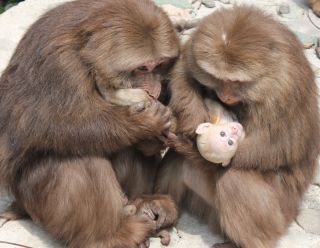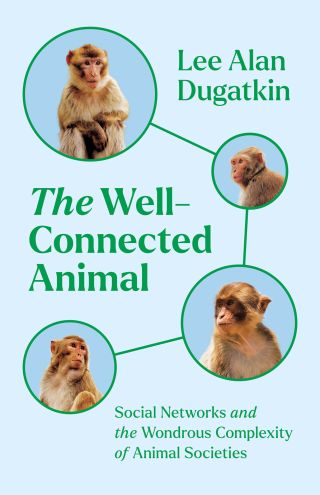Social Networking
We Are What We Connect
Why your social network is your best asset.
Updated June 14, 2024 Reviewed by Jessica Schrader
Key points
- Social networks are an evolved feature critical for social animals, including humans.
- Social networks in Tibetan macaques can facilitate group coordination and precipitate decision-making.
- Social disconnection can hurt our mental well-being, especially for women and immigrants.
A few years ago, I noticed a student in trouble. He had started the quarter active and lively, often engaging me with thoughtful questions. However, about halfway through, he began to skip classes. When I inquired, he confided that he was battling depression and struggling to stay afloat, yet still failing in all his courses. He revealed that he was from a Vietnamese immigrant family. New to our small town, he had no friends and couldn’t escape the acute feelings of loneliness and isolation.
I advised that he continue with his current treatment and encouraged him to consider taking some time off. Perhaps, I suggested, spending time with friends and relatives back home might help. A few days later, the registrar sent me an email, informing me that he had dropped the class, and I didn’t hear from him—until a year later.
He unexpectedly dropped by my office. “I’m back, Dr. Sun.” Fresh and happy, he showed no signs of the depression that had weighed him down before. He told me he had taken my hint and stayed with his friends and family in Seattle.
“Please don’t thank me,” I told him, feeling a deep sense of joy for his recovery. “Thank my monkeys, instead.” I was referring to the Tibetan macaque that we—including my students Gregory Fratellone, Amanda Rowe, Rose Amrhein, Debby Lewis; and colleagues Jinhua Li, Dongpo Xia, Xi Wang—have studied for decades.
I wasn’t joking, though. I gained many insights about the importance of social networks from studying these macaques. They spend most of their waking hours grooming each other, massaging their relationships. This is especially true for females, who form the core of their society (1). As a result, the more females in a group, the faster they arrive at decisions for group movement, essential for finding food, seeking safety, and defending against invasions (2).
In probing how they coordinate their activities, we discovered that they follow a simple-majority democracy in their decision-making. As long as more than half of the members join in, a group activity will always take place. But who assumes the leadership role? For this, we examined the structure of their social network (3).

As it turned out, dominant females are more effective leaders because they have more “fans.” You might think, “Nothing’s new—Taylor Swift’s popularity lies in her huge fan base.” However, there’s a major difference: Taylor Swift doesn’t follow back to many of her fans, but dominant macaques do (4). Thus, in their society, fan and fandom reinforce each other, much like super connectors on Facebook or Twitter (now X).
Tibetan macaques offer us just a glimpse into the complex world of animal social networks. For a deeper dive, you may want to turn to Lee Alan Dugatkin’s new book, The Well-Connected Animal. Dugatkin, a distinguished professor of Animal Behavior and Evolution and the author of two of my course textbooks, uses his simple yet elegant prose to illuminate how animals build and leverage their social networks.
The book showcases a range of fascinating examples: rhesus macaques use their well-groomed social ties to survive deadly hurricanes, vampire bats rely on cave members for vital blood meals, and great tits share and learn strategies for stealing milk. And there are many other delightful stories of social networks including those in manta rays, kangaroos, Tasmanian devils, elephants, giraffes, and whales.

Dugatkin not only explores these captivating cases but also connects them to cutting-edge research in computer science, psychology, genetics, and neurobiology. By the end of The Well-Connected Animal, you’ll be thoroughly convinced of the crucial role social networks play in the lives of social animals—including us.
Today, we find ourselves living in increasingly smaller family units, a stark contrast to the extended families and clans in history and maybe prehistory. Much like our primate cousins, women, in particular, have a heightened need for social connections. Their risk of depression can be double that of men (5), a disparity partly attributable to reduced and weakened social networks.
Despite this, our diminished social ties are somewhat mitigated by frequent interactions in various social venues—schools, workplaces, sports events, churches, bars, and hobbies. Yet, the true value of these interactions often goes unappreciated until they are lost, as we painfully learned during the early stages of the COVID-19 pandemic. It was also during this time that we realized that virtual networks on Facebook, Twitter, and other platforms could not replace genuine, in-person connections.
The aftermath of social isolation lingers. The mental health issues stemming from prolonged isolation still haunt us, widespread and tangible even more than a year after the pandemic’s official conclusion. Young people—middle- and high-schoolers, as well as college students—who experienced their formative years during this period of social distancing were hit particularly hard. Many are still struggling to recover from the lost time for bonding with peers.
I was able to help my depressed student because I, too, suffer from the deprivation of a robust social network—one large enough to resort to for sharing a moment of joy, for occasional help with chores beyond my own capacity, for guidance in adapting to my adoptive country, or for a shoulder to cry on when faced with injustice. I never forget my academic mentor, who was born in Germany and emigrated to America, telling me, “It’s always hard for an immigrant to strike out a living in a new place.”
As an immigrant, I have been removed from the established social circles of my native country. Since then, my social network has always been small, leaving me sometimes feeling like a kite without a string, a spider with no web, a fish out of water, a lonely ship in the open sea. Despite being in a high-risk group for inadequate social connections, I have steadfastly refused to become a victim of depression. This keen and constant awareness of the importance of social networks has made me particularly value kinship and friendship, which are our best resort for sanity and our best asset for happiness.
References
Xia, Dongpo, Jinhua Li, Paul A. Garber, Lixing Sun, Yong Zhu, and Binghua Sun. "Grooming reciprocity in female Tibetan macaques Macaca thibetana." American Journal of Primatology 74, no. 6 (2012): 569-579.
Fratellone, Gregory P., Jin-Hua Li, Lori K. Sheeran, R. Steven Wagner, Xi Wang, and Lixing Sun. "Social connectivity among female Tibetan macaques (Macaca thibetana) increases the speed of collective movements." Primates 60 (2019): 183-189.
Wang, Xi, Lixing Sun, Jinhua Li, Dongpo Xia, Binghua Sun, and Dao Zhang. "Collective movement in the Tibetan macaques (Macaca thibetana): Early joiners write the rule of the game." PLoS One 10, no. 5 (2015): e0127459.
Rowe, Amanda K., Jin-Hua Li, Lixing Sun, Lori K. Sheeran, R. Steven Wagner, Dong-Po Xia, Derek A. Uhey, and Rui Chen. "Collective decision making in Tibetan macaques: how followers affect the rules and speed of group movement." Animal Behaviour 146 (2018): 51-61.
Kornstein, Susan G., Alan F. Schatzberg, Michael E. Thase, Kimberly A. Yonkers, James P. McCullough, Gabor I. Keitner, Alan J. Gelenberg et al. "Gender differences in chronic major and double depression." Journal of Affective Disorders 60, no. 1 (2000): 1-11.




